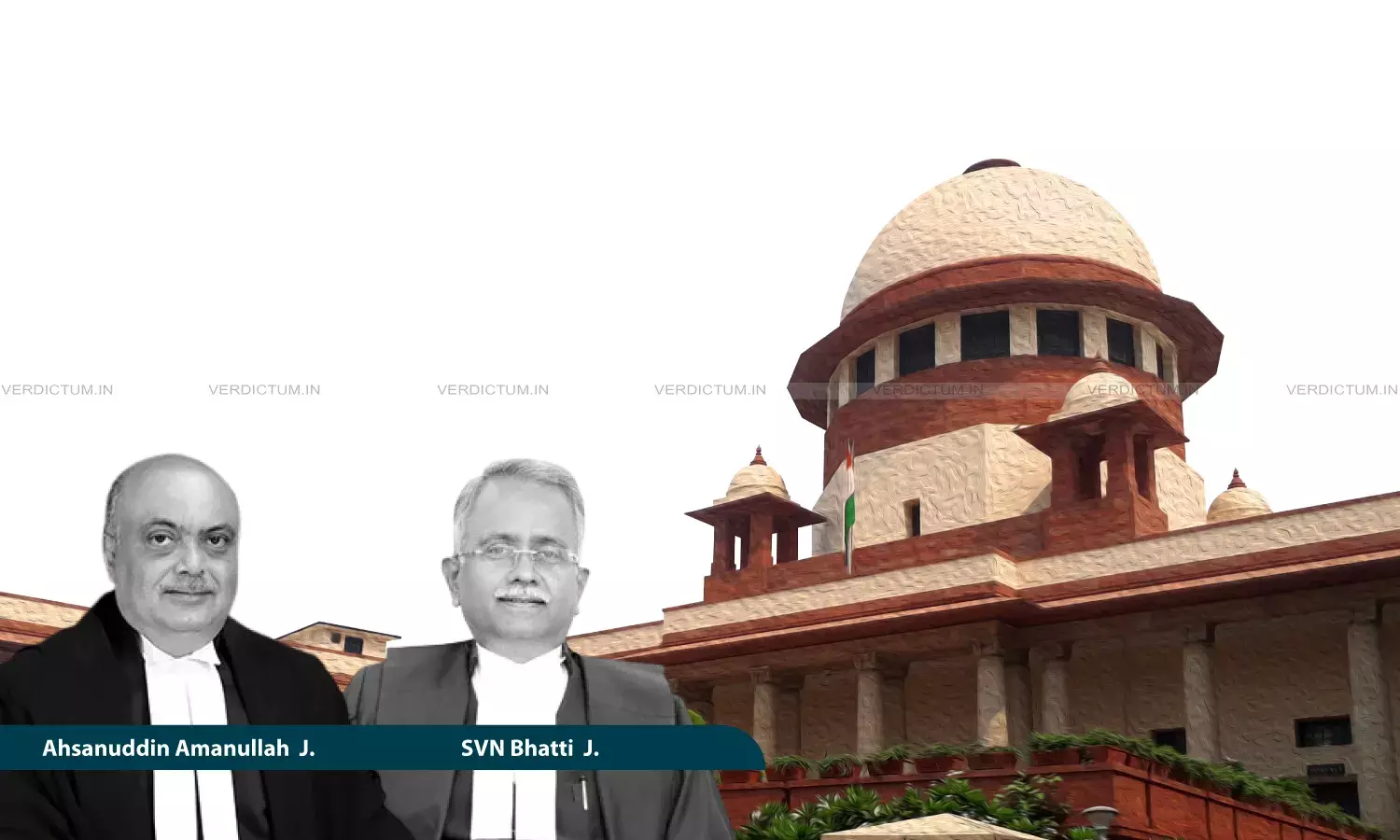Supreme Court: Bail Orders Should Offer Cogent & Germane Reasoning
The appeal before the Supreme Court arose from the Impugned Order passed in a Criminal Miscellaneous Bail Application passed by the Allahabad High Court granting bail to the respondent accused.

Justice Ahsanuddin Amanullah, Justice S.V.N. Bhatti, Supreme Court
While setting aside an order granting bail to an accused person in a criminal case, the Supreme Court has held that bail orders should offer cogent and germane reasoning and this should not be misunderstood to convey that such orders should be long and lengthy.
The appeal before the Apex Court arose from the Impugned Order passed in a Criminal Miscellaneous Bail Application passed by the Allahabad High Court granting bail to the respondent accused.
The Division Bench of Justice Ahsanuddin Amanullah and Justice S.V.N. Bhatti held, “We must clarify that we should not be misunderstood as having conveyed that bail orders should be long and lengthy, but, in the facts of this case, when this Court had, while cancelling and/or setting aside bail granted on two previous occasions, examined all relevant aspects in extenso, it was incumbent upon the High Court to provide comprehensive reasoning, moreso, in light of this Court’s observation of future consideration of bail ‘at a later stage.’ What this Court has repeatedly cautioned against is to refrain from elaborately discussing/detailing the evidence or the view of the Court thereon while considering grant of bail.”
Reference was made to the judgments in Niranjan Singh v Prabhakar Rajaram Kharote, (1980); Vilas Pandurang Pawar v State of Maharashtra (2012); Atulbhai Vithalbhai Bhanderi v State of Gujarat, (2023).“... but that does not obviate the bail order from offering cogent and germane reasoning, bearing in the mind the dicta in Manoj Kumar Khokhar v State of Rajasthan, (2022)...”, it added.
Advocate Anas Chaudhary represented the Appellant while Senior Advocate Shikil Shiv Suri represented the Respondent.
Factual Background
The Respondent was booked in a case filed by the appellant informant under Sections 147, 148, 149, 352, 302, 307, 504 and 34 of the Indian Penal Code, 1860. Initially, when bail was granted to the respondent accused by the High Court, the appellant moved the Apex Court and the matter was remanded to the High Court. This led to the second round and the respondent pursued his prayer for bail in the High Court. The High Court once again granted bail to the respondent accused. The Apex Court interfered with the bail order and granted a window to the respondents-accused to move for bail afresh. The Trial Court rejected the bail plea while the High Court allowed the same. It was in such circumstances that the matter reached the Apex Court.
Reasoning
On a perusal of the facts of the case, the Bench found that the Impugned Order required intervention. “The scheme of the Constitution mandates that all Orders/Judgments of this Court have to be given due deference to by all other Courts, including the High Courts, in letter and in spirit”, it said.
The Bench referred to a Judgment passed on May 17, 2024, wherein it was indicated that ‘… in the event of any new circumstances emerging, the respondents shall be entitled to apply for bail at a later stage.’ As per the Bench, the May 17 Judgment dealt with the relevant parameters for granting bail and the considerations for setting aside bail orders. Throwing light upon the impugned order passed by the Single Judge, the Bench stated that observations such as ‘one sided investigation by police’ and ‘ignoring the case of accused side’ besides being thoroughly unwarranted, had absolutely no nexus with the prayer for bail which the Single Judge was seized of.
“Given the heinous nature of the alleged offence(s), in our considered view, it was not open to the High Court to make ‘5-6 times overcrowding in jails’ as a ground to allow bail. Further, as evincible, the Impugned Order notes certain facts at Paragraph 9 but Paragraph 11 does not really offer insight into the actual view of the High Court thereon or on the ‘new circumstances’ sought to be put forth by respondent no.1 in Paragraph 4 of the Impugned Order. Moreover, the Impugned Order has omitted to consider the detailed Judgment dated 17.05.2024 to cull out whether ‘new circumstances’ had emerged to enlarge respondent no.1 on bail. In this view, the caveat that the Impugned Order was passed ‘without expressing any opinion on the merits of the case’ pales into insignificance and is not nearly enough for us to sustain the same”, the Bench mentioned.
Thus, allowing the appeal, the Bench quashed the impugned Order and set aside the bail granted to the first respondent. Further highlighting the fact that a person should not suffer for no fault of his or the fault of others, the Bench concluded, “Therefore, in case, genuinely, for reason(s) not attributable to respondent no.1, things are not taken to their logical conclusion expeditiously, he shall be at liberty to approach this Court directly for obtaining bail.”
Cause Title: Ajwar v. Waseem & Anr. (Neutral Citation: 2025 INSC 968)
Appearance
Appellant: Advocates Anas Chaudhary, Alia Bano Zaidi, AOR Ansar Ahmad Chaudhary
Respondent: Senior Advocate Shikil Shiv Suri, Advocates M. Z. Chaudhary, Tabarq Hussain, Aftab Ali Khan, AOR Vishal Arun Mishra

